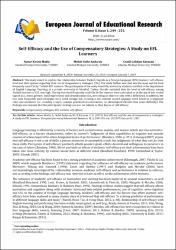Self-efficacy and the use of compensatory strategies: A study on EFL learners
Künye
Kesen Mutlu, A., Andarab, M. S. ve Karacan, C. G. (2019). Self-efficacy and the use of compensatory strategies: A study on EFL learners. European Journal of Educational Research, 8(1), 249-255. https://dx.doi.org/10.12973/eu-jer.8.1.249Özet
This study aimed to explore the relationship between Turkish English as a Foreign Language (EFL) learners’ self-efficacy level and their opinion regarding their use of compensatory strategies (CSs). The study further searched into the most and the least frequently used CSs by Turkish EFL learners. The participants of the study were fifty university students enrolled in the department of English Language Teaching at a private university in Istanbul, Turkey. Results indicated that the level of self-efficacy among Turkish learners of EFL was high. The top two most frequently used CSs by the learners were concluded to be the use of non-verbal signals (i.e., mime, gesture, facial expression) and circumlocution (i.e., describing an object or idea with a definition). In addition, the two least frequently used strategies were word coinage (i.e., creating a non-existent second language word based on a supposed rule) and avoidance (i.e., avoiding a topic, concept, grammatical construction, or phonological element that poses difficulty). The findings also revealed that the participants’ strategy use was not related to their degree of self-efficacy.


















